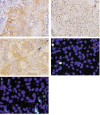Correlation of genes associated with drug response to prognosis of large cell lung carcinoma
- PMID: 21718596
- PMCID: PMC4013425
- DOI: 10.5732/cjc.010.10503
Correlation of genes associated with drug response to prognosis of large cell lung carcinoma
Abstract
Platinum-based chemotherapy remains the main treatment of advanced lung cancer. However, platinum resistance has become a major treatment obstacle. Novel therapies, particularly tyrosine kinase inhibitors of the epidermal growth factor receptor (EGFR-TKI) and agents that target vascular endothelial growth factor (VEGF), have improved the treatment. Both chemotherapy and targeted therapy have their molecular mechanisms. This study aimed to determine the mutation, amplification, or expression status and interrelationships of the epidermal growth factor receptor (EGFR), K-Ras proto-oncogene, excision repair cross-complementation group 1 (ERCC1), and VEGF genes as well as their correlations to prognosis of large cell lung carcinoma (LCLC) after EGFR-targeted therapy, chemotherapy, and anti-VEGF therapy. EGFR and K-Ras mutations in 60 specimens of LCLC were detected by direct DNA sequencing. EGFR, ERCC1, and VEGF protein expression was detected by immunohistochemistry (IHC). EGFR gene copy number was detected by fluorescence in situ hybridization (FISH). One (1.7%) patient had an EGFR L858M point mutation in exon 21, 3 (5.0%) had K-Ras mutations, and 10 (19.6%) had EGFR amplification (FISH positive). Positive rates of EGFR, ERCC1, and VEGF proteins were 38.3%, 56.7%, and 70.0%, respectively. EGFR amplification was positively correlated to EGFR protein expression (r = 0.390, P = 0.005). The positive rate of VEGF protein was significantly higher in patients with lymph node metastasis than in those without (84.6% vs. 58.8%, P = 0.046). No significant correlations were observed among the EGFR, K-Ras, ERCC1, and VEGF genes. EGFR gene amplification and the low rate of EGFR mutation suggest that patients with LCLC are likely to obtain little benefit from anti-EGFR therapies.
Figures


References
-
- Jemal A, Siegel R, Ward E, et al. Cancer statistics, 2008 [J] CA Cancer J Clin. 2008;58(2):71–96. - PubMed
-
- Wilson MD, Ruttan CC, Koop BF, et al. ERCC1: a comparative genomic perspective [J] Environ Mol Mutagen. 2001;38(2–3):209–215. - PubMed
-
- Zhou W, Gurubhagavatula S, Liu G, et al. Excision repair cross-complementation group 1 polymorphism predicts overall survival in advanced non–small cell lung cancer patients treated with platinum-based chemotherapy [J] Clin Cancer Res. 2004;10(15):4939–4943. - PubMed
-
- Spira A, Ettinger DS. Multidisciplinary management of lung cancer [J] N Engl J Med. 2004;350(4):379–392. - PubMed
Publication types
MeSH terms
Substances
LinkOut - more resources
Full Text Sources
Medical
Research Materials
Miscellaneous
